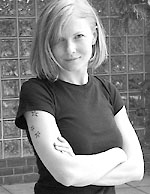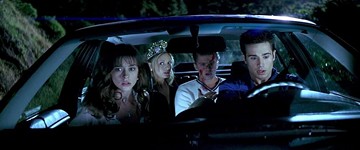In Person
The 2002 Texas Book Festival
By Roger Gathman, Belinda Acosta, and Maria Hong, Fri., Nov. 22, 2002

The Natural World
John Graves and Thomas McGuane
Saturday, Nov. 16, Auditorium Capitol Extension Room E1.004
How much history fits into a word? For instance, the word "water." As I pronounce the word, you can see a thin, clear fluid coming out of a tap in some suburban dwelling. The engineering of the faucet is more interesting than the fluid, in this picture. But as legendary Texas writer John Graves pronounces it, you can envision 75 years of hardscrabble ranching, vast underground reaches of dark, wet calciferous rock, the afternoon sky being scanned for clouds by leather-faced men calculating the exact ratio between rainfall, grass, and beef yield. Graves has the undeniable historic presence of some very articulate survivor of a wreck.
Saturday's Texas Book Festival panel on Nature was "sold-out" -- so many people crowded into the auditorium to hear John Graves and Thomas McGuane talk that the Capitol police were forced to prevent an overflow crowd from entering the room. The tone was melancholic, as both Graves and McGuane agreed the old-style ranching culture is on its last legs, and, in their experience, the natural world as we have known it is undergoing some silent, vast damage. They also agreed that the voracious exploitation of natural resources in this country is inevitably leading us to some kind of crash. Graves listed the names of Texas aquifers as if he were reciting some odd Texas Kaddish. McGuane, who has owned a ranch in Montana for 30 years, noted the changes in the ranching culture: the increased anger and the greater importance given to symbols of identity like cowboy hats and rodeo shows; he attributed it to a culture that is defying the outside world as it teeters on the edge of extinction. But neither Graves nor McGuane was presenting himself as a political activist. Asked what he would recommend as a public policy agenda for the environment, McGuane recommended that everybody get a dog. Or a goldfish. "It's important to have something that's not human around you." And Graves was definitely not looking at rural culture as some nostalgic bearer of moral values. "Where I live," he said, "is in tough country. This was marginal land for cattle and cotton. Those who could, moved west. Those who couldn't, lived on cutting cedar fence posts and making moonshine whiskey. I sorta miss the old-timers. They were tough people and not always nice."
As good an epitaph as any for that old Southwest farming culture, two generations away from the original settlers, who have long been displaced by the lesser Sunbelt culture of SUVs, high tech, and suburban sprawl. -- Roger Gathman
When Race Becomes Real
David H. Bradley, Robert Jensen, and Jim Schutze
Sunday, Nov. 17, Capitol Extension Room E2.014
Bernestine Singley is one of those women some can't help gravitate toward or, alternately, fear. Singley is a speak-her-mind kind of woman who doesn't suffer fools and asks hard questions, the kind of questions many try to avoid, ignore, or -- in the worst possible scenario -- deem irrelevant in polite society. Well, Singley isn't all that concerned about being polite. Fortunately, she isn't alone in her mission to discuss the hard questions. So, when she approached 30 writers, black and white, to write personal essays about race, she found herself in welcome company.
"I did not want white writers to wax nostalgic about their 'best black friend,'" she reiterated from her introduction to When Race Becomes Real: Black and White Writers Confront Their Personal Histories (2002, Lawrence Hill Books) and the subject of a Sunday afternoon Texas Book Fair presentation. "Keep yourself at the center of the narrative and write about what it's like to be white at the end of the 20th century. To black writers, I said, 'Drop the arm's-length objectivity and write about race the way you talk about race when white folks aren't in the room."
Singley, along with University of Texas professor Robert Jensen as well as novelist and Michener Center visiting writer David Bradley, spoke eloquently about their contributions. Jensen speaking about white privilege from a white man's perspective; Bradley sharing thoughts on the lynching narrative as it appears in the late-20th and early-21st century.
Included in When Race Becomes Real are contributions from successful writers, newspaper columnists, activists, academics, and even a 12-year-old honor student. It is one in a four-volume series, the next featuring Latino writers. For the writers at this panel and Singley -- a former attorney general in Massachusetts and Texas, and a past Dewitt Wallace Reader's Digest Fellow -- the mesmerizing privilege of amnesia is there for the taking. So why not?
"I have a choice each day: to stand still and remember, or to flee and forget. I am still standing. And I remember with a vengeance," Singley says.
Heaven help those who think they can forget. -- Belinda Acosta
Sheer Poetry: Readings
Betty Adcock, Wendy Barker, and Deborah Parédez Sunday, Nov. 17, Capitol Extension Room E2.012"There are people who can read the phone book and make it sound good, but it's still the phone book. The poetry slam leaves me dead cold, because I've never heard a good poem at one of them," said Betty Adcock in response to moderator Jack Brannon's question about what elements make poetry readings satisfying versus the "major nap" they can be.
Adcock, who is the author of five collections of poetry including Intervale: New and Selected Poems, emphasized her belief in the "oral magic of poetry," but said that the "dramatic element can overwhelm the literary element" in readings where performance is king.
Deborah Parédez, author of the poetry collection This Side of Skin and a drama instructor at Vassar University, responded that while performative virtuosity is sometimes given precedence over the craft of writing, "I'm a big fan of both, and I don't think one has to exclude the other. I have seen extremely well-crafted poems at the National Poetry Slams." Parédez also said that in readings poets should understand how to "give words life," and how reading poetry to an audience is an "act of translation," as most audiences haven't been trained to listen to poetry.
Wendy Barker, the author most recently of Poems' Progress, a collection of poems and autobiographical essays about the writing process, noted that the success of a poetry reading depends much on the audience's expectations, and that as a poet-reader, it's often difficult to gauge in advance what kinds of poems a particular audience will be receptive to. "We want magic to happen, though I don't think it often does." As a listener to other people's poetry, she said, "I want to be taken through a range of experiences."
Prior to the discussion, each of the poets read poems from their recent books. Adcock talked about how growing up in East Texas informed two of the poems she read, including a 16-line mono-rhymed lyric about the music of fox-hunting. Barker also drew on family anecdote to introduce her love poem to a favorite gay, bohemian uncle, "Black Sheep, White Stars," and read another poem in the voice of mad Bertha from Jane Eyre. Parédez introduced her poems as revisions of myths, including "1001," which features a young male Scheherezade and "Sonnets for Eurydice," which relocates the doomed love story at the border.
The panel's last word was uttered by a white-haired gentleman in the first row who said, "When the poet gives background for a poem, it helps me understand it. I enjoyed this. Each of these poets gave something of themselves in the reading, so it was not just the poem itself. Anyway, I'm glad I came." -- Maria Hong












